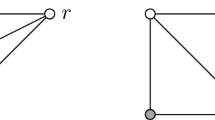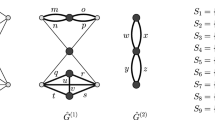Abstract.
A general ordertheoretic linear programming model for the study of matroid-type greedy algorithms is introduced. The primal restrictions are given by so-called weakly increasing submodular functions on antichains. The LP-dual is solved by a Monge-type greedy algorithm. The model offers a direct combinatorial explanation for many integrality results in discrete optimization. In particular, the submodular intersection theorem of Edmonds and Giles is seen to extend to the case with a rooted forest as underlying structure. The core of associated polyhedra is introduced and applications to the existence of the core in cooperative game theory are discussed.
Similar content being viewed by others
Author information
Authors and Affiliations
Additional information
Received: November 2, 1995 / Accepted: September 15, 1999¶Published online February 23, 2000
Rights and permissions
About this article
Cite this article
Faigle, U., Kern, W. On the core of ordered submodular cost games. Math. Program. 87, 483–499 (2000). https://doi.org/10.1007/s101070050008
Issue Date:
DOI: https://doi.org/10.1007/s101070050008




